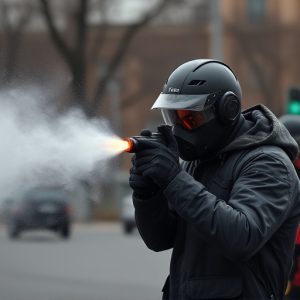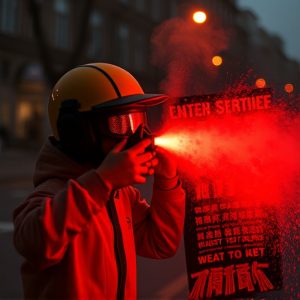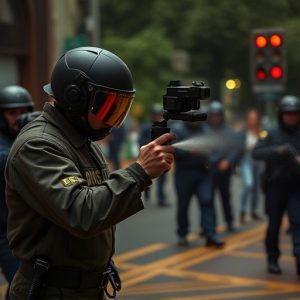Decoding OC Spray: Fact vs. Fiction on Pepper Spray’s Effects and Safety
Orange-coloured capsaicin in OC spray disrupts skin and mucous membranes, causing intense irritatio…….
Orange-coloured capsaicin in OC spray disrupts skin and mucous membranes, causing intense irritation upon contact. Contrary to myths about permanent blindness, the effects are temporary, inducing extreme pain, uncontrollable tearing, and temporary blindness—a condition known as flash-blindness—for a few minutes. It's crucial to use OC spray correctly to avoid causing lasting eye damage or accidental harm due to cross-contamination or improper technique. Safety, understanding its effects including range and potential reverse flow, and proper training are indispensable for safe application of pepper spray as a non-lethal self-defense tool. It's important to clarify that while pepper spray can cause temporary blindness, it does not lead to permanent blindness, addressing the common question "Can pepper spray blind you?" Training ensures users comprehend both the tool's effectiveness and its limits.
oc Spray: A Comprehensive Guide to Self-Defense and Safety
When it comes to personal safety, understanding the tools at your disposal is crucial. One such tool is OC (Oleoresin Capsicum) spray, commonly known as pepper spray. This article delves into the science and safety considerations of using OC spray, addressing common misconceptions such as “can pepper spray blind you?” By exploring its effects and the circumstances under which it can be effectively used for self-defense, readers will gain a clear understanding of how this non-lethal deterrent operates and its potential impact on assailants. Join us as we navigate the critical aspects of OC spray and clarify any doubts surrounding its use.
Understanding OC Spray: The Science and Safety Behind Pepper Spray Use
Orange-coloured capsaicin, the active component in OC spray, disrupts the skin and mucous membranes’ normal functioning upon contact, leading to intense irritation. The effects of OC spray are highly effective as a non-lethal self-defense tool due to its ability to incapacitate an assailant by causing temporary blindness, difficulty in breathing, and profound pain. It’s a common concern whether pepper spray can cause permanent blindness; however, it’s important to clarify that while it can temporarily blind an attacker by causing extreme pain and uncontrollable tearing, rendering them disoriented and unable to see for a few minutes, it does not cause long-lasting harm to the eyes when used as directed.
When using OC spray, safety considerations are paramount. It’s crucial to understand that exposure to OC spray can occur through direct contact or through secondary contamination if not handled correctly. To minimize risks, always follow the manufacturer’s guidelines for use and storage. Additionally, it’s essential to be aware of the potential for cross-contamination; directing the spray towards a wind source can lead to its spread in undesirable directions. Proper training on the application and understanding of the product’s effects, including its range and the potential for it to drift back towards the user, are critical for safe use. Understanding the science behind OC spray and adhering to safety protocols ensures that users can effectively protect themselves without causing harm beyond the intended self-defense purpose.
Can Pepper Spray Cause Blindness? Assessing the Risks and Misconceptions
Pepper spray, a commonly used self-defense tool, is designed to incapacitate an assailant by causing intense irritation to their eyes and respiratory system. The active ingredient in most pepper sprays is oleoresin capsicum (OC), which can cause significant pain and temporary blindness. It’s a misconception that pepper spray can permanently blind someone; however, it can indeed cause a condition known as flash-blindness or temporary blindness. This occurs because the chemical irritates the eyes to such an extent that the eyelids reflexively close, preventing light from entering and allowing vision to return after the effects wear off. Understanding the distinction between temporary and permanent blindness is crucial when discussing the capabilities of pepper spray. The risks associated with its use are primarily related to the intensity of the spray and the sensitivity of the individual exposed. Proper training in the use of pepper spray ensures that it is used effectively as a non-lethal self-defense mechanism, while also recognizing its limitations and potential effects on the user’s attacker. Misconceptions about pepper spray often exaggerate its long-term impact on vision; however, it’s important to acknowledge that even temporary loss of sight can be a serious consequence that should be considered when evaluating the use of such a tool for self-defense.


